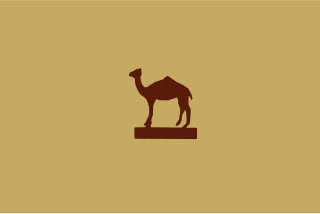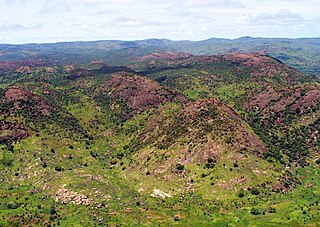Related Research Articles

The Kordofanian languages are a geographic grouping of five language groups spoken in the Nuba Mountains of the South Kordofan region of Sudan: Talodi–Heiban languages, Lafofa languages, Rashad languages, Katla languages and Kadu languages. The first four groups are sometimes regarded as branches of the hypothetical Niger–Congo family, whereas Kadu is now widely seen as a branch of the proposed Nilo-Saharan family.

The demographics of Sudan include the Sudanese people and their characteristics, Sudan, including population density, ethnicity, education level, health, economic status, religious affiliations, and other aspects of the population.
Moro may refer to:

Kordofan is a former province of central Sudan. In 1994 it was divided into three new federal states: North Kordofan, South Kordofan and West Kordofan. In August 2005, West Kordofan State was abolished and its territory divided between North and South Kordofan States, as part of the implementation of the Comprehensive Peace Agreement between the Government of Sudan and the Sudan People's Liberation Movement. West Kordofan was reestablished in July 2013.

The Nuba Mountains, also referred to as the Nuba Hills, is an area located in South Kordofan, Sudan. The area is home to a group of indigenous ethnic groups known collectively as the Nuba peoples. In the Middle Ages, the Nuba mountains had been part of the Nubian kingdom of Alodia. In the 18th century, they became home to the kingdom of Taqali that controlled the hills of the mountains until their defeat by Mahdi Muhammad Ahmad. After the British defeated the Mahdi army, Taqali was restored as a client state. Infiltration of the Messiria tribe of Baggara Arabs has been influential in modern conflicts. Up to 1.5 million people live in the mountains, mostly ethnic Nuba, with a small minority of Baggara.
The Nuba people are indigenous inhabitants of central Sudan. The Nuba are made up of 50 various indigenous ethnic groups who inhabit the Nuba Mountains of South Kordofan state in Sudan, encompassing multiple distinct people that speak different languages which belong to at least two unrelated language families. Since 2011, when the southern part of Sudan became an independent state as South Sudan, the Nuba now live in the southern part of Sudan. Estimates of the Nuba population vary widely; the Sudanese government estimated that they numbered 2.07 million in 2003.
The Dilling are an ethnic group of the Nuba peoples. The Dilling number 12,000 and live mainly in the Nuba Mountains of South Kordofan state, in southern Sudan.
The Moro Nuba are a sub-ethnic group of the Nuba peoples in the Nuba Mountains of South Kordofan state, in southern Sudan. Many members of this ethnicity are Christians. The population of this ethnic group possibly exceeds 80,000 people.
The Karko are a sub-ethnic group of the Nuba peoples in the Nuba Mountains of South Kordofan state, in southern Sudan.
The Krongo Nuba are a sub-ethnic group of the Nuba peoples in the Nuba Mountains of South Kordofan state, in southern Sudan. They number several 10,000 persons. This minority is divided in terms of religion.
Lafofa is an ethnic group among the Nuba people of Sudan. It likely numbers less than 10,000 persons. This minority is mainly Muslim. Many of them speak Arabic. The traditional language is Lafofa, a Niger–Congo language. They live in South Kurdufan.
The Logol are a sub-ethnic group of the Nuba peoples in the Nuba Mountains of South Kordofan state, in southern Sudan. Its population is estimated to be under 10,000.
The Otoro Nuba are an ethnic group in the Nuba Mountains of South Kordofan state, in southern Sudan.
The Tagale are a sub-ethnic group of the Nuba peoples in the Nuba Mountains of South Kordofan state, in southern Sudan.
The Talodi are a sub-ethnic group of the Nuba peoples in the Nuba Mountains of South Kordofan state, in southern Sudan. They likely number more than 1,000 people.
The Tira are a sub-ethnic group of the Nuba peoples in the Nuba Mountains of South Kordofan state, in southern Sudan. The population of this group is 37,000.
The Daju people are a group of seven distinct ethnicities speaking related languages living on both sides of the Chad-Sudan border and in the Nuba Mountains. Separated by distance and speaking different languages, at present, they generally have little cultural affinity to each other.

The Talodi–Heiban languages are a proposed branch of the hypothetical Niger–Congo family, spoken in the Nuba Mountains of Sudan. The Talodi and Heiban languages are thought to be distantly related by Dimmendaal, though Glottolog 4.4 does not accept the unity of Talodi–Heiban pending further evidence.
The Logorik are an ethnic group in the southern part of Sudan. They are one of seven distinct ethnicities comprising the Daju people. They speak the Logorik language, a Nilo-Saharan language. They live in the north, central Nuba Mountains in the Jebel Liguri hills area northeast of Kadugli. The population of this ethnic group likely exceeds 2,000.
Um Heitan, or Umm Heitan, is a village in Dalami, South Kordofan, Sudan, that is 5 kilometres (3.1 mi) from south of Kadugli, the state capital. The area is an active war zone.